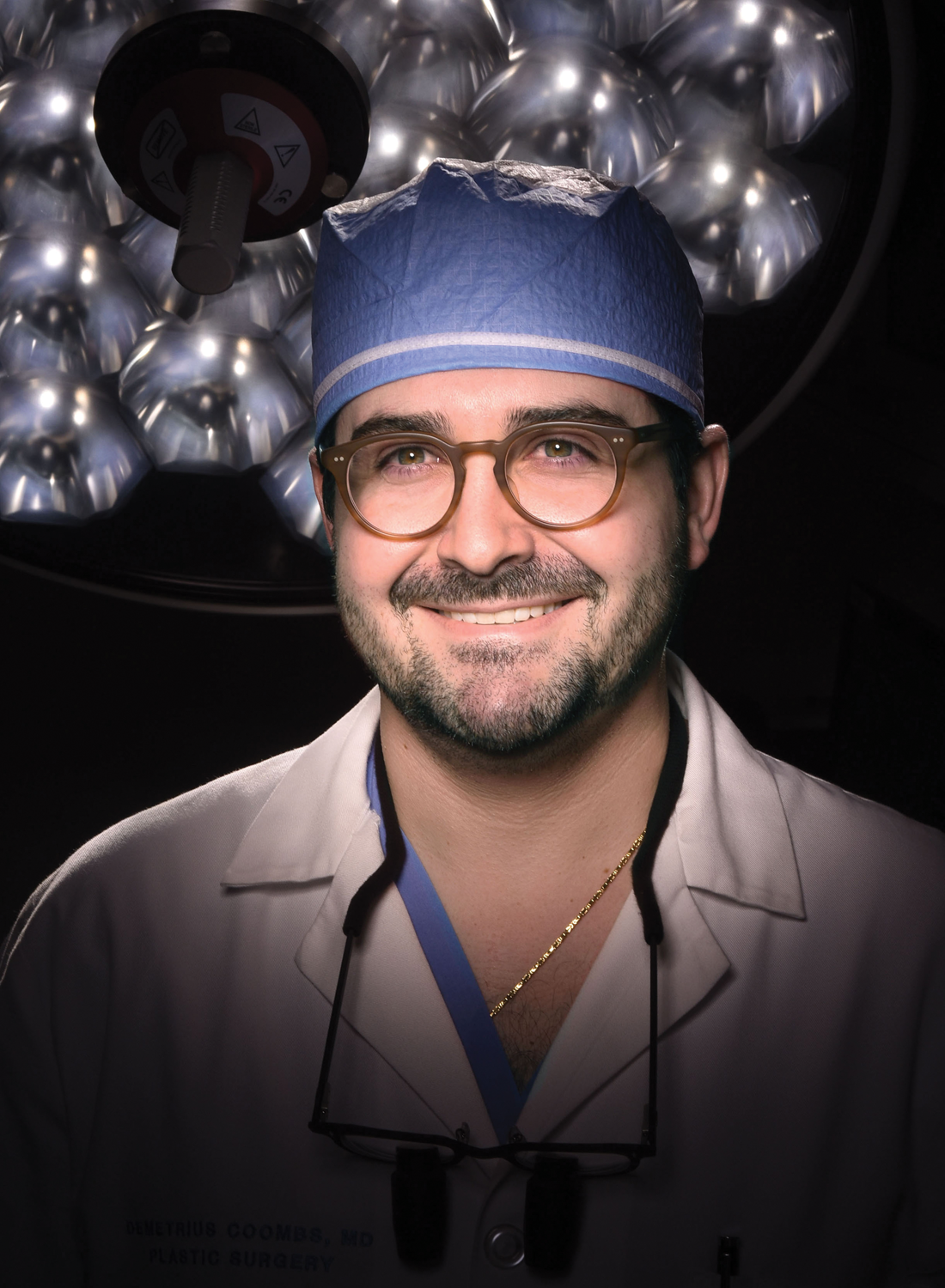
The Interdisciplinarian

Honors alum helps provide care for historic face-transplant patient
by Johanna Droubay
photograph by Pat Shoda
The vast complexity of the face is difficult to comprehend. It is not only the epicenter of much of our sensory intake: it is an emotional center too. A lifted brow or narrowed eyelid can communicate our state of being. What people see when they look into our eyes influences how we are perceived. “It’s not static, like a mask,” says plastic and reconstructive surgery resident Demetrius Coombs, MD (Honors ’11). “It’s dynamic and responsive, and the emotional capability is just as important as the functional utility.”
Demetri had just finished medical school when he was thrust into the middle of a historic medical and surgical moment: the reconstructive surgery of the youngest face-transplant recipient in US history. The patient’s name is Katie Stubblefield, and the story of her transplant was chronicled in the September 2018 issue of National Geographic. Katie was 18 when she survived a dramatically disfiguring suicide attempt. She was 21 when she underwent a 31-hour face transplant at the Cleveland Clinic in Ohio, where Demetri had become a resident physician in the Department of Plastic Surgery just in time to assist with Katie’s care.
He was a sophomore in college when a family friend made a connection that gave him access to a plastic-surgery operating room in Salt Lake City—that of internationally renowned surgeon Dr. Renato Saltz. “I thought it was incredible that every day your job could involve moving people’s skin and muscles around to create something entirely different,” he says. “It was like a metamorphosis.”
After graduating from Westminster, Demetri enrolled in a medical humanities program while pursuing his MD degree at Drexel University College of Medicine. He studied medicine through the lens of history, religious and spiritual thought, the arts, and other disciplines. Of the 250 students in his medical school class, fewer than a dozen eventually finished the humanities program. Two received the Drexel Medical Humanities Award at graduation: Demetri was one of them.
“I don’t think I would have sought out the medical humanities program—or carried through with it—if it hadn’t been for Westminster, Honors, and Honors College Dean Richard Badenhausen,” Demetri says. “Honors taught me early on why interdisciplinary education enriches the learning experience, regardless of your course of study.”
Demetri was first exposed to reconstructive plastic surgery at Pittsburgh’s Allegheny General Hospital under two senior plastic surgeons, Drs. Frederick Heckler and Michael White. “They gave me small responsibilities commensurate with my ability as a medical student,” Demetri says. “Oftentimes they’d be asking me questions while I worked, so I had to sew and answer at the same time.” It was part boot camp, part surgical laboratory, and the sky was the limit.
Demetri has published research on plastic surgical procedures, but also on experiences as a medical student and plastic-surgeon employee. He has written about burnout and medical errors and published in the fields of radiology, gynecologic oncology, and, soon, orthopedics. He’s currently working with surgical residents at Yale, Cornell, and the University of Washington to develop an app that changes the way medical students study for national exams.
“I wouldn’t be compelled to look at these kinds of provocative issues if it weren’t for my multidisciplinary background,” he says. “I wouldn’t care, or I’d be less likely to collaborate. I’d just focus on surgery and science, like a laser beam, and miss important relationships.”
For his capstone project at Drexel, Demetri investigated the ethics of using an anatomy text that has long been considered one of the best in the field but that was developed in Nazi-occupied Austria, likely using the bodies of political prisoners as research subjects. His findings were eventually published in the Annals of Anatomyand the Journal of Neurosurgery.
“Every day in plastic surgery, different services are calling you to help,” he says. “Neurosurgery is calling you to create muscle flaps to cover exposed spinal hardware, cardiac surgery needs help closing the chest, or vascular surgery needs emergent assistance with covering exposed vessels.”
In the case of Katie Stubblefield, Demetri was privileged to help in yet another way, both inside and outside the operating room. He became acquainted with her and her family, bearing witness to their experience.
When he thinks about the emotional and technical complexities of Katie Stubblefield’s story, he almost can’t grasp the enormity of the narrative. “It’s one of the most amazing things in the world,” he says. “And I’m so fortunate to have played a small part in her care.”
About the Westminster Review
The Westminster Review is Westminster University’s bi-annual alumni magazine that is distributed to alumni and community members. Each issue aims to keep alumni updated on campus current events and highlights the accomplishments of current students, professors, and Westminster alum.
GET THE REVIEW IN PRINT Share Your Story Idea READ MORE WESTMINSTER STORIES